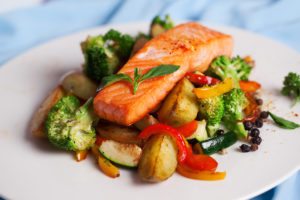Complete Proteins: What Caregivers Need to Know
Senior Care Salisbury NC
One aspect of caring for an senior loved one is preparing meals and ensuring that they eat a nutritious diet. Senior adults need to eat a nutrient-rich diet to prevent chronic medical conditions, strengthen the immune system, maintain strong bones and muscles, have energy, and have good quality of life. One nutrient that is essential is protein. Protein can be obtained from many different sources from meats and fish to beans and peas. However, the type of protein from animal sources and plants sources can be quite different which is why it is important for caregivers to understand the difference between complete and incomplete proteins.
What is the difference between a complete and incomplete protein?
Protein, the nutrient that helps your loved one have strong healthy muscles, is made up of chemical compounds called amino acids. There are essential amino acids which must be obtained from diet and there are non-essential amino acids which the body can make if needed. If a protein has all of the essential amino acids, it is called a complete protein. But, if it doesn’t, it is considered an incomplete protein. Senior adults need complete proteins in their diet to stay healthy and strong.
What foods contain complete proteins?
Animal sources of protein are complete proteins. Your loved one can get complete proteins by eating chicken, turkey, dairy foods, eggs, pork, beef, and fish. There are also some plant sources of compete proteins that include soy, quinoa, hemp, amaranth, and chia. If your loved one eats a vegetarian diet, it is important for them to eat meals that contain these plant sources of complete proteins. Strive to serve your loved one plenty of complete proteins each day in the form of lean proteins such as salmon, chicken breast, and low-fat milk as well as plant sources of complete proteins.
What foods have incomplete proteins?
There are many other plant sources of proteins that do not have all of the essential amino acids needed to make them complete proteins. These include beans/legumes, nuts, rice, and wheat. Of course, these foods are healthy and filled with other nutrients that make them great choices for your loved one’s meals. However, they cannot be relied on alone as sources of complete proteins. Some incomplete proteins, however, can be combined to make a compete protein when eaten together. An example of this is rice and beans.
Source: http://www.shape.com/healthy-eating/diet-tips/ask-diet-doctor-complete-and-incomplete-proteins
If you or an aging loved one are considering Senior Care Services in Salisbury NC, please contact the caring staff at Tender Hearted Home Care today. (704) 612-4132.
- Understanding the Conditions Linked to Hearing Loss - July 24, 2024
- 5 High Protein Foods That Are Easy for Seniors to Eat - July 8, 2024
- Easy Workouts For Seniors This Summer - June 21, 2024


